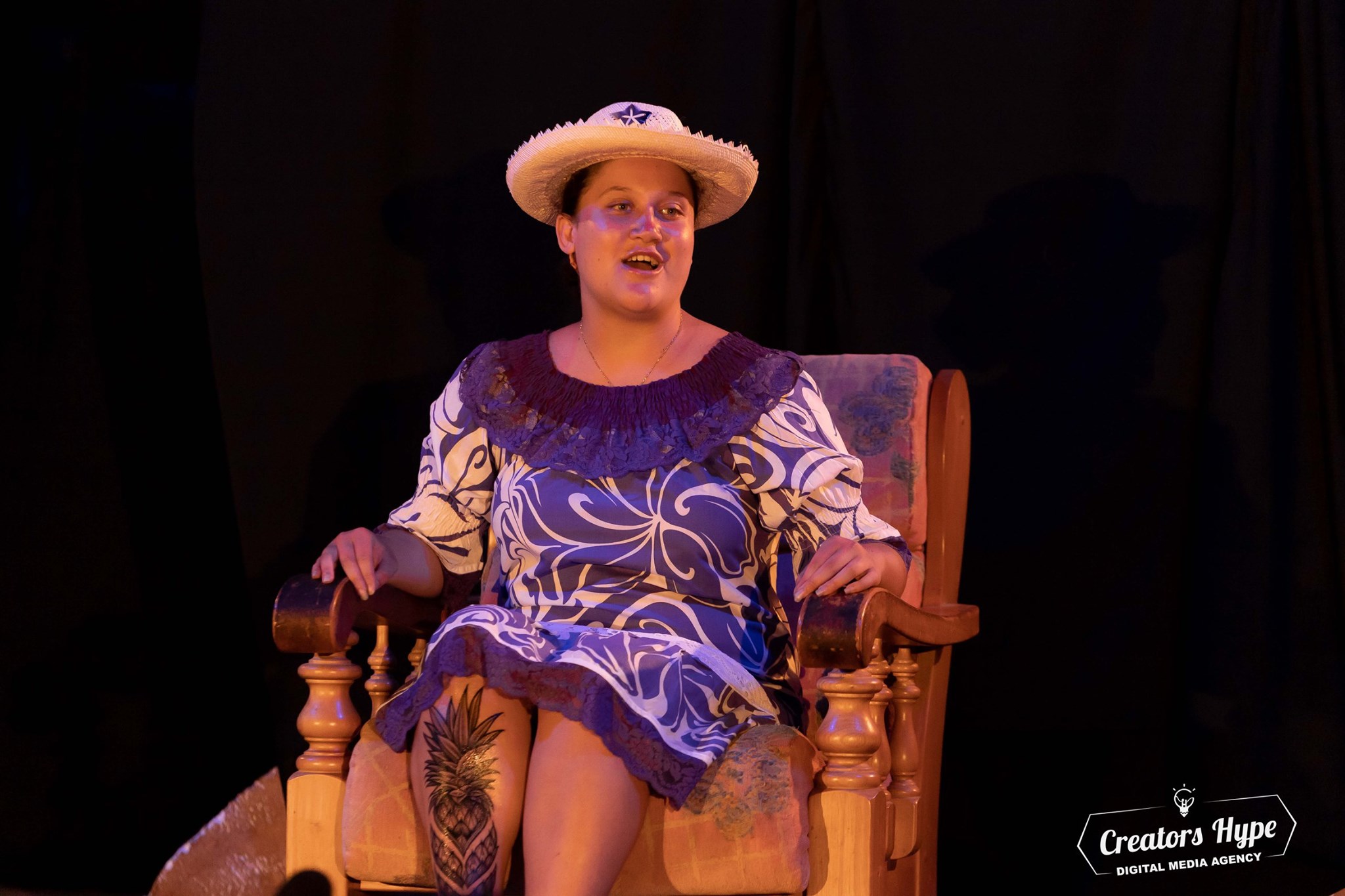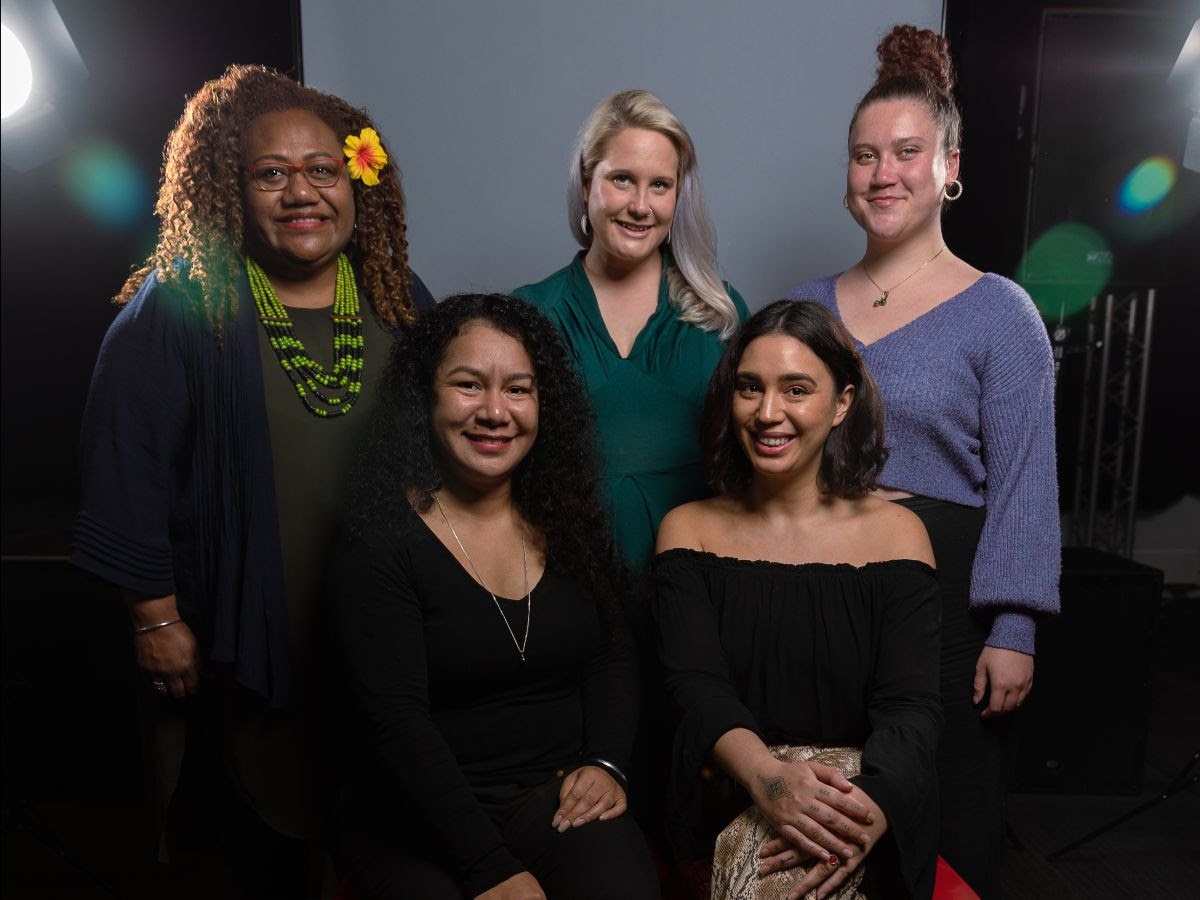Making her voice heard
Saturday 26 November 2022 | Written by Matthew Littlewood | Published in Features, Weekend

Teherenui Kotea performs at Rehab in Rarotonga back in 2020. Photo: Supplied/Creators Hype/22112508
Teherenui Koteka wants Cook Islands and Pasifika people to survive and thrive in the topsy-turvy world of creative arts both here and abroad. The playwright talks to senior journalist Matthew Littlewood about her latest work and her aspirations for the future.
Koteka is never lost for words. The 23-year-old playwright, who is part of Pasifika and Māori artist collective Maranga Mai, bounced ideas all over the place over the course of our conversation.
She is about to launch radio play Te Maunga, Te Toa e Manakia, which focuses on issues such as land ownership and cultural heritage.
Koteka is back in the Cook Islands for a few months, and hopes to get back in touch with the community.
Her most recent work was a long time in the making, but Koteka feels really proud of what she achieved.
“It’s really a piece about land inheritance and how we as Cook Islanders deal with the commercialisation of land in contrast to our traditional values of sharing land for the people,” Koteka says.
“We’re evolving as a people, and the land is running out. People are getting increasingly smaller plots. I’d been wanting to write a piece like this for a while.”
The play focuses on a world estranged from indigenous values, where an offer arises forcing two cousins to decide the fate of their ancestral home.
“I switched ideas for the play a few times. This is the first time I’d written for radio. I’m a visual writer, and making the transition was so difficult. I wrote it during lockdown, and being stuck indoors with no one to bounce ideas off was a challenge. There were a lot of firsts for me.”

Koteka describes her writing process as idiosyncratic.
“I usually start with a whole bunch of sticky notes on the wall. I start with a theme a lot; I write for our people. I think art is a great way to generate conversation around subjects which are considered taboo, if you remove it from reality and make it fictional, people are more likely to talk about it,” she says.
“I like to look at society and if I see something that I think needs to be talked about, that gets my creative process going, I chuck it up on the wall and see what happens. Sometimes it will inspire 500 notes on the wall, other times, it will be just five.”
Te Maunga, Te Toa e Manakia frequently shifts perspectives between the two cousins and the god looking over the land.
“I think I write quite metaphorically a lot when I’m dealing with issues such as land and the environment,” Koteka says.
“Cook Islands Māori as a language is quite metaphorical anyway, so I try to integrate it into writing as much as possible. There’s something quite poetic about it, so I enjoy using it.”
Koteka
never expected to go down this career path. She says she hated creative writing at school, and it was only guidance as a first-year Theatre Studies student that got her involved in playwriting.
“I had no idea where I was going in theatre, all I knew was that I didn’t want to be an actor. I thought I would be stage manager or something. It wasn’t until Mīria George and Hone Kouka of Tawata productions, suggested I give it a try, and it went from there.”
Her work over the past few years has explored subjects such as sexuality, the environment, Cook Islands culture, and climate change.
She joined the Maranga Mai collective about two years ago. The collective, which also features Tina McNicholas, Sandra Tisam, Sherilee Kahui and Stevie Greeks, are all launching new work.
“The New Zealand writing scene is really male-heavy,” Koteka says.
“When you go through school, speech and drama might be seen as girly things, but when you actually go into the industry, it’s not like that at all, it’s very male-dominated. That’s why collectives such as this are so important,” Koteka says.
She says the lack of Cook Islanders in the industry is also a challenge.
“One of the big challenges which I face smack-bang from the start of any project is finding the Cook Islands arts people who can fill in the roles, there’s not enough of us in the industry in Aotearoa and at home. So, I’m hoping more will come through,” Koteka says.
“It’s something special to me when I see second-generation Pasifika artists, because we’re told by so many that it’s not viable. But I always tell young people there’s no better time to be a Pasifika artist than now, you can get in on the ground floor and really change things.”
Koteka says she tries to write as much of herself into her work as she can.
“I always write a bit of myself into everything. I’m not trying to tell people what to think, but I want them to talk about these issues.”
Koteka
will be staying in the Cook Islands over the summer, after being based in Wellington since she left school. She still feels very attached to the Cook Islands.
“I introduce myself as a Cook Islander first and foremost. I love everything about this place. As soon as I get off the plane, everyone is saying hello to you. I love the community,” she says.
Koteka wants to give back to the Cook Islands community.
She oversees a collective of school-aged writers in the Cook Islands, called Te Atamira Arts Kumete Collective, offering them assistance and encouragement in putting together theatrical pieces.
She hopes to bring in four to six interns into the collective in the next few months.
“I think that as a people the Cook Islands and the Pacific community love to show our youth, but don’t always want to hear what we have to say,” Koteka says.
“I think the Cook Islands is at a real transitional period of its history. It’s really important to nurture the voices coming out. There’s a real opportunity here.
“As a people, we don’t always encourage our young people to pursue their passions, particularly in the arts. This is bizarre to me, because we’re such an artistic people. I see so much talent in this country, and a real opportunity to nurture it.”
Koteka says it’s also important that these young people got paid to work.
“It’s a great way to show that there is financial reward for your work out there,” she says.
“These kids are so self-driven; I don’t have to be hands-on. I can’t wait to see what they produce.”
Koteka has just finished her Masters in Creative Writing at the Institute of Modern Letters at Victoria University in Wellington.
“I think my writing has changed drastically. I’m always learning, I don’t think I’ll stop learning.
“I think I’ve learned story structure a lot better, I’ve become a lot more finetuned in working out what’s important for the audience.”
She has written a feature film, which explores some of the themes of Te Maunga, Te Toa e Manakia.
“It’s a very different mode of writing, but the seeds of it are in there,” Koteka says.
“There’s a common misconception with art that once it’s up, it’s up, but in reality, the first time you produce something or show something, that’s a first draft. It’s ever-evolving.”
But it’s been a busy few years for Koteka, who has written several plays, helped other artists and watched her career grow.
“I really love what I do, I mean, can you imagine me as a lawyer? I’m so happy I made the leap,” Koteka says.
Te Maunga, Te Toa e Manakia, will be launching and available for streaming from November 26 as part of the digital theatre Moana Nui.














































